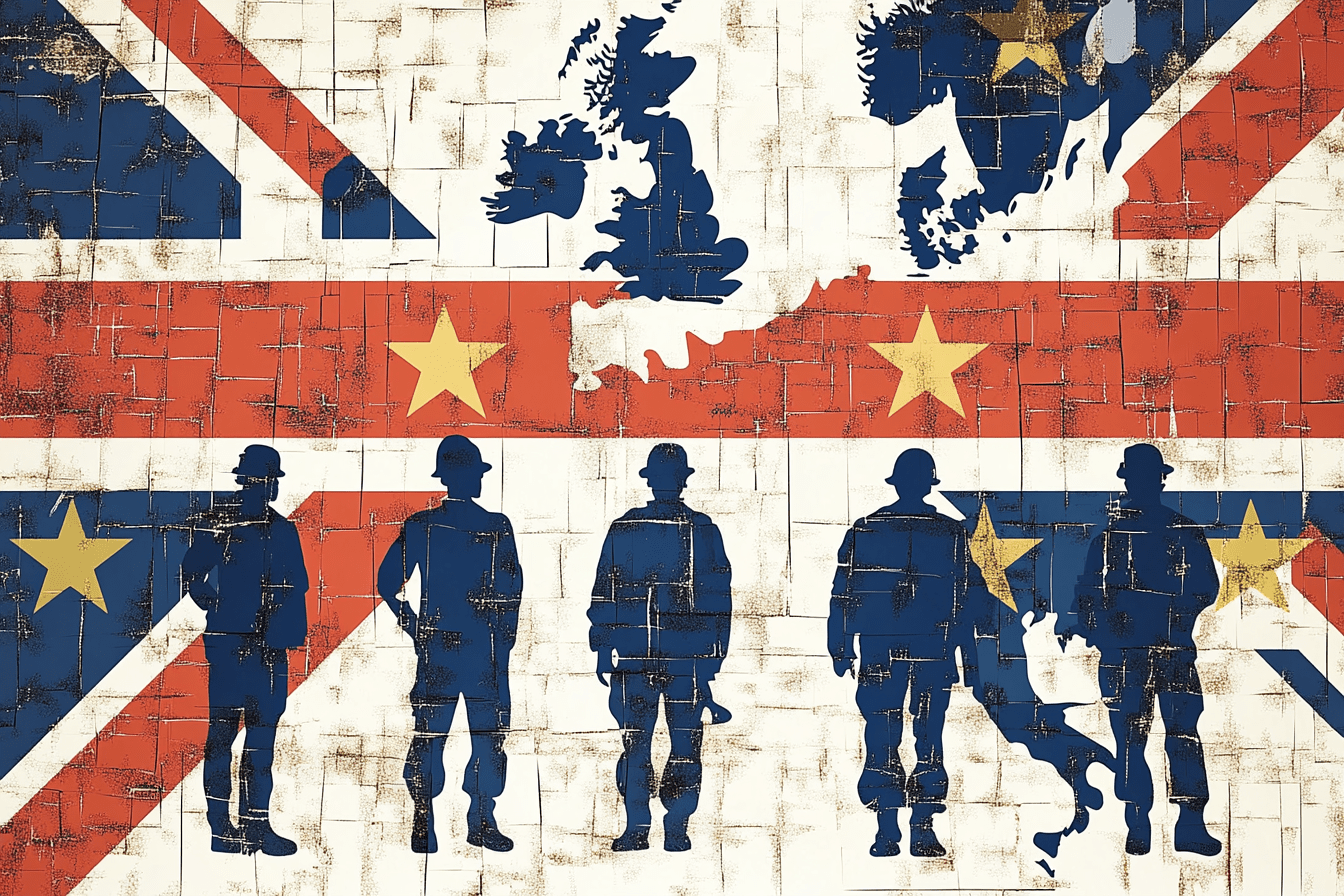How to Structure an Initial EU/UK FSDP Partnership Package
We must be realistic about the level of structured cooperation we can expect to be able to achieve with the EU in the immediate term. But we should be ambitious

-
File
My talk will focus on how to structure an initial EU/UK partnership package on foreign, security, and defence policy (or “FSDP”). I’m going to make four short points, under these headings:
- The choice between ad hoc and structured cooperation.
- An incremental approach.
- Models of structured cooperation.
- Elements of a plausible negotiating package.
The choice between ad hoc and structured cooperation
First point, on the choice between ad hoc and structured cooperation. Should the UK be content, for the time being, to show willingness, by proactively seeking out opportunities for ad hoc cooperation with the EU? Or should the aim be to establish a structured UK/EU FSDP relationship?
In favour of ad hoc cooperation, it might be argued that there’s still some way to go in dispelling the hangover from Brexit. The argument would be that the task of restoring the EU’s trust in the UK as a reliable international partner could better be achieved by maximising participation by the UK in the various aspects of FSDP activity that are open to third countries, and where it has interests in common with the EU. Attempting, at this stage, to negotiate an overarching framework for FSDP cooperation would be a distraction.
That is not my view. Cooperating, each time in an ad hoc way, may be difficult, as William Hague, speaking as a former Foreign Secretary, told the House of Lords European Affairs Committee in 2023. An organising framework that is appropriately flexible can incentivise cooperation in the policy areas that it covers. And it needn’t impede collaborative activity in other areas.
At all events, that ship has sailed. Both the UK and the EU have made it clear that they are committed, in principle, to a structured future relationship. The UK Foreign Secretary, David Lammy has repeatedly referred to the Labour government’s aim of negotiating a “security pact” with the EU. And the Statement that was issued after the meeting between Prime Minister Keir Starmer and the Commission President, Ursula von der Leyen, after their meeting on 2 October, referred to the resolve of the EU and the UK “to strengthen their structured strategic cooperation”.
An Incremental Approach
My second point is the need for the UK to adopt an incremental approach. We must be realistic about the level of structured cooperation we can expect to be able to achieve with the EU in the immediate term. But we should be ambitious as to what may be achievable in the medium term. Which I would understand as a period of 5 to 10 years, in other words, roughly covering the life of two Parliaments
In the medium-term, I suggest, the UK’s goal should be the development of an overarching structure for FSDP cooperation with the EU, framing the whole of foreign, security, and defence policy, together with related areas such as counterterrorism, control of external borders and energy supply; and that cooperation should be underpinned by institutional arrangements enabling the systematic involvement of UK representatives at each stage of the process of preparing decisions by the EU Council on FSDP matters, up to the level of the Political and Security Committee (PSC).
Indeed, I can see no objection in primary EU law to the creation of a special form of observer status for the UK, and other close EU allies like Norway, giving them the right to speak but not vote, at Council meetings. And I’d go further.
If the EU follows up the idea of allowing candidates for EU membership to participate in actual decision-making for certain limited purposes, which would require Treaty amendments, why shouldn’t the UK (and Norway) be given the same right regarding FSDP decisions?
Cooperation at such a high level of intensity could only be achieved incrementally, as the habit of working together develops, and with increasing experience of the value-added the UK, as a third country, may be able to bring to EU policy-making.
It will, of course, be for HMG (His Majesty's Government), and for the EU to determine how far along the path of intensive cooperation they wish eventually to go. But both sides need to be clear that the arrangements for FSDP cooperation they may be able to negotiate in the coming months represent, not a definitive FSDP relationship, but the first steps of an evolutionary process towards a broad, deep, and truly novel partnership.
Choosing a Model of Structured Cooperation
My third point is about choosing between models of structured cooperation, since it’s handy in negotiations with the EU to be able to point to a precedent for what you’re asking for. Realistically, there are just two possibilities: a strategic partnership agreement (or SPA), like the one with Canada; and a tailored security and defence partnership, like the one recently established with Norway.
At first sight, the EU/Canada SPA might seem an attractive model for organising the UK/EU relationship on FSDP. It’s a legally binding international agreement, not yet ratified by all Parties, though large parts of it have been given provisional application. The SPA extends over a wide range of policy areas, including human rights, democracy and the rule of law; international peace and security; economic cooperation and sustainable development; science, technology, and innovation; and energy, the environment, and climate change.
The cooperation mechanisms take the form of annual summits at the leader level and regular meetings and consultations at ministerial and official levels.
Periodic reports on the state of the EU/Canada relationship indicate a high level of satisfaction with its operation on Canada’s part. However, there are telling arguments against the UK opting for the SPA model, at least at this stage.
First, negotiating a binding international agreement covering a range of highly sensitive matters is likely to take several years. Negotiations for the EU/Canada SPA commenced in September 2011, and the Agreement was signed on 3 December 2016 and given provisional application from 1 April 2017. In the present perilous state of geopolitics, the UK and the EU will be looking for a quicker result.
A second issue concerns ratification by the EU and all 27 Member States. I mentioned that the ratification process of the EU/Canada SPA hasn’t yet been completed, some eight years after it was signed. Though that’s less serious than might at first appear, given the very extensive provisional application that was deemed legally possible and appropriate for the Agreement.
However, to my mind, the main argument against the SPA model for the UK/EU relationship on FSDP is that it would be too constraining. As I’ve said, the UK’s approach to its relationship with the EU on FSDP should be incremental. A binding international agreement in the form of a SPA would risk inhibiting the evolutionary potential of the relationship.
In contrast, the alternative model of a tailored security and defence partnership appears eminently suited to the UK’s purposes.
The idea of developing a new security and defence instrument, in the form of a tailored, non-binding framework of cooperation for selected partners, was first floated in the document known as the “Strategic Compass”, which the EU Council approved in March 2022. That document, it’s worth recalling, referred in the context of its discussion of this new instrument to the EU’s being open to “a broad and ambitious security and defence engagement with the United Kingdom”.
A Security and Defence Partnership between the EU and Norway was signed in May of this year. The Partnership text begins by noting “the volatile and increasingly challenging security environment in Europe” and the Parties’ commitment to upholding international law, the rules-based international order, democracy, and human rights; and it recalls existing areas of cooperation between them.
There’s a section on the “dialogue and consultation mechanisms” underpinning the project. And the text goes on to provide an extensive list of areas of cooperation. These include continued long-term support for Ukraine; international peace and crisis management, with Norway undertaking to continue its participation in the EU’s CSDP civilian missions, and to consider extending this to military missions; exploring the possibility of Norway’s further involvement in the EU’s defence industry initiatives and in PESCO projects; cyber issues; counterterrorism; and external aspects of economic security.
Of course, Norway’s relationship with the EU is quite different from the UK’s. It’s a member of the EEA and thus a participant in the internal market; and the Partnership text describes it as “the EU’s most closely associated partner, including in the area of security and defence”. Whereas the UK remains, for the time being at least, resolutely outside the single market, and has yet to win its spurs as a third country partner of the EU on FSDP matters.
Nevertheless, the EU/Norway Security and Defence Partnership seems to me an extraordinarily apt template for those that will soon be negotiating the future FSDP relationship with the EU on the UK’s behalf.
The Elements of a Plausible Negotiating Package
This brings me to my fourth and last point: the elements of a plausible negotiating package. I suggest that those elements are to be found in the Security and Defence Partnership between the EU and Norway, with suitable adaptations.
Indeed, the opening paragraph of the EU/Norway text, on the security situation in Europe and the Parties’ shared values, could be transposed directly to a Security and Defence Partnership between the EU and the UK, merely substituting references to the UK for those to Norway. And other passages could similarly be copied out, such as the paragraph on NATO and several of the provisions defining the various areas of cooperation.
However, significant adaptations will be needed to cater for the specific situation of the UK.
In the first place, the various references to participation by Norway in EU activities such as CSDP missions or PESCO projects, will have to be re-written in terms that look forward to the UK’s future participation.
Secondly, I suggest the UK should propose that the scope of the Partnership be extended to cover foreign policy. This would make sense, because foreign policy, security, and defence are a continuum, as the EU Treaties recognise. And because foreign policy is a field where the UK has traditional strengths from which the EU can benefit. The extension to foreign policy, if acceptable to the EU and wanted by Norway, could be applied to the latter.
Thirdly, lacking the institutional ties that Norway already has with the EU through the EEA and other cooperation structures, the UK will need a more muscular institutional framework for its FSDP partnership than the three consultation mechanisms referred to in paragraph 11 of the EU/Norway text. These are: a standing invitation from the High Representative for Norway to participate in the biannual Schuman Security and Defence Forum; the High Representative to invite Norway, where appropriate, to high-level meetings, including of the Council; and a dedicated Security and Defence Dialogue between Norway and the EU to take place annually.
I agree with Luigi Scazzieri, in his excellent piece for the CER on a UK/EU Security Pact, that the UK and the EU should agree to hold an annual summit and regular meetings between ministers and officials.
This should be done immediately (realistically, in early 2025), by way of a joint declaration, which could be subsumed into a subsequent FSDP partnership instrument, once that has been negotiated.
I suggest also that there be a reference to possible invitations for the UK’s Foreign Secretary to attend the informal so-called “Gymnich” meetings of EU Foreign Ministers; and perhaps even a standing invitation, though that may be too ambitious for the time being. Any such strengthening of the consultation framework should also be offered to Norway.
Those are my ideas for a plausible negotiating package on FSDO cooperation, which I hope would be a good first step towards a much deeper medium-term relationship. I had better end there.
This commentary is part of the edited transcript of a IEP@BU-Center for European Law at the King’s College of London debate on “The Future of EU and UK Foreign Policy”. The event took place in London, on November 14, 2024

Cooperating, each time in an ad hoc way, may be difficult. An organising framework that is appropriately flexible can incentivise cooperation in the policy areas that it covers. And it needn’t impede collaborative activity in other areas
IEP@BU does not express opinions of its own. The opinions expressed in this publication are those of the authors. Any errors or omissions are the responsibility of the authors.
